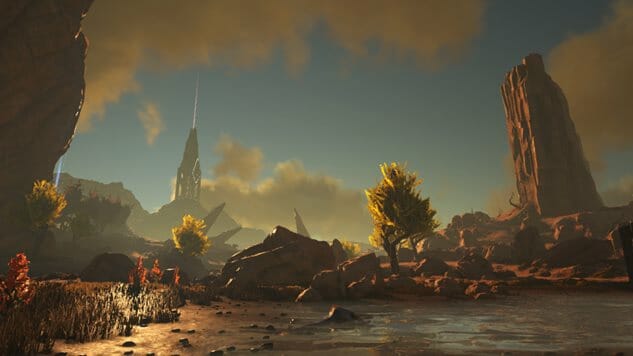ARK: Survival Evolved and the Problem with Open World Games

I’m what you would call a videogame creationist. I believe that videogames, like many other forms of media, are best when they are under the direction of a creator. Not always a single creator, mind you (though I do believe too many cooks spoil the broth). But at the very least, a firm guiding hand with an overarching artistic vision that provides a framework for what a game will be.
In that sense, roguelikes rarely appeal to me. I like the added challenge of not being able to memorize a track or floorplan, relying on spontaneity and quick response skills alone. But in general, I think environmental design suffers when an element of randomness is added, as even a single placed item can tell a story. In a roguelike, the player already knows that much of the environment will bear no direct influence on the story itself, and thus, they know that they can ignore it. This cheapens the game itself, reducing it to mere set dressing for its mechanics. Efficient game design has given way to impersonal game design, depriving it of meaning. Games are so much more than their mechanics.
A timely example of this is ARK: Survival Evolved, the Early Access game which is expected to release officially this year. Set on a mysterious island filled with dinosaurs and ancient beasts, players begin the game naked and defenseless, spawning at a random point somewhere in the wilderness. As they level up, they gain the tools and tech needed to craft items of increasing sophistication, risking their lives to dangerously trek across the land in pursuit of obscure resources. Players can team up with others, build bases, tame animals, and indulge in other survival based elements for the good of their tribe, culminating in a combined cooperative strength that takes them through the game’s many bosses, and its end-game reveal.
Throughout the game’s long development cycle, it has been subject to monthly content updates, adding new tools and animals and dinosaurs on a regular basis and giving the players a look at the refinement process by making them an active part of it. And for its premise, I like ARK.
But the game is only built for mischief. Studio Wildcard have done a lot to give players freedom in gameplay, but stop short of providing the proper tools to ensure a conflict-free experience. The developers have stated a commitment to cooperation and collaboration between their players: “Regarding overall philosophy, we do intend to try to foster more cooperation than some other survival genre titles, both from a design and a community interaction standpoints,” they’ve said.
But the problem is, they haven’t designed for it. They cite the game’s “RPG elements” (statistical loot drops, raids, and bosses), local play support and player hosted servers as features that facilitate a more cooperation-oriented community. But with the addition of certain items like human restraints, cages and cannibalism, they seem to be encouraging the opposite. The official FAQ even gives directions on how to enslave other players. It feels a bit like a parent tossing a pair of handcuffs and a set of hog ties to their eldest child and saying, here, go play nice with your siblings. The greater community has a set of rules that cover various forms of griefing but never directly address the hostility facilitated by the game’s permissive mechanics. The pervasive lack of technological boundaries has created a lawless environment on top of a drifting, unfocused and sometimes nebulous experience.
 Keep scrolling for more great stories.
Keep scrolling for more great stories.


